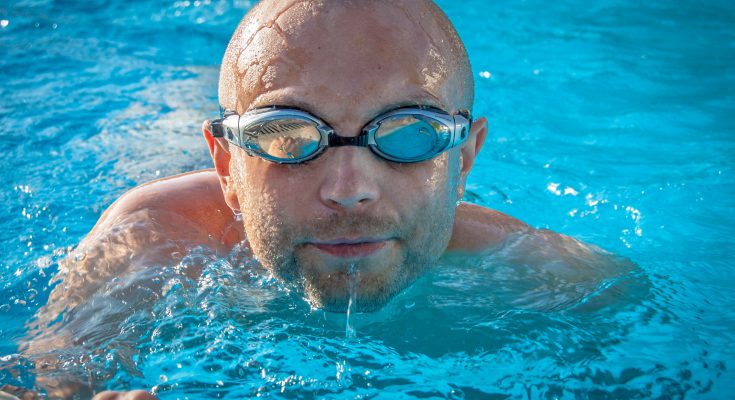Photo: CSG Swim Gear Ltd
What exactly is swimmer’s ear? According to the Merriam Webster’s definition, it is an inflammation of the outer ear canal that is characterized by itching, redness, swelling, pain, and discharge that typically occurs when water gets trapped in the outer ear during swimming and becomes infected with a bacterium.
After a swim, water can settle in the outer ear canal, the ear part that leads to the inner ear, and get blocked in there by wax, fluids and even dead skin. Aside from this being annoying and uncomfortable, it can become infected due to bacteria or fungal organisms. Of course, this can happen in any environment where water comes in contact with the outer ear, such as the shower and bathtub. Most swimmers merely shake their head repeatedly towards their shoulder in a jerking motion to dislodge the water, but what do we do if this does not work?
Swimmer’s Ear – Doctor’s Office Treatment
 Typically, after the doctor (an ear, nose and throat specialist) takes their otoscope or auriscope and look inside the ear, he/she may use hydrogen peroxide and a suction instrument or an ear curette to clear the ear. Then the doctor will check to see if the patient has a healthy ear, that is to say, that the ear isn’t perforated (has a hole), or infected. If this is the case, drops will more than likely be prescribed.
Typically, after the doctor (an ear, nose and throat specialist) takes their otoscope or auriscope and look inside the ear, he/she may use hydrogen peroxide and a suction instrument or an ear curette to clear the ear. Then the doctor will check to see if the patient has a healthy ear, that is to say, that the ear isn’t perforated (has a hole), or infected. If this is the case, drops will more than likely be prescribed.
Antibiotics are commonly the cure given for infections. They are typically administered in the form of ear drops. They work to decelerate the fungal growth and reduce swelling due to inflammation. Usually, there is a 7-10 treatment duration. Follow the instructions carefully and take the drops for all the days specified as there is a specific length of time as well as dosage required. Together with antibiotics, the specialist may also prescribe a prescription of pain killers, if needed, possibly something over-the-counter like ibuprofen or perhaps something stronger like codeine.
If an initial round of these treatments do not work, other options may have to be implemented. The specialist may have to irrigate the ear canal several times to remove the blockage. Unfortunately, there have been incidences where swimmers, particularly those with preexisting immune deficiencies, have experienced more advanced concerns due to the infection spreading to the body’s tissue and bone. In these severe cases, surgery may be the best option.
Swimmer’s Ear – A Simple Home Remedy
Surprisingly, this home remedy actually works. Please note, that if you have had ear surgery or have any other  concerns with your inner ear, consult your physician first prior to trying any home remedies for swimmer’s ear. When it comes to medications be they those made with common ingredients or those prescribed, use caution and speak to your doctor. Each body is different and there is no one cure that heals all.
concerns with your inner ear, consult your physician first prior to trying any home remedies for swimmer’s ear. When it comes to medications be they those made with common ingredients or those prescribed, use caution and speak to your doctor. Each body is different and there is no one cure that heals all.
Here are the ingredients:
- White vinegar (fights germs)
- Rubbing alcohol (dries ear out)
Here are the instructions:
Pour equal amounts of the white vinegar and rubbing alcohol together. Put the mixture together in a bottle and shake. With a dropper, draw up some of the mixture, tilt your head to the side and drop some into the infected ear.
What to Do the Next Time You Swim?
If you are prone to swimmer’s ear, prevention and proper maintenance may greatly improve your chances of keeping this condition at bay. Here are some simple things you can do to protect your ears:
- Wear ear plugs
- Pull your swim cap over the ears
- Do not use q-tips because they may scratch the eardrums
- Dry the ears carefully and thoroughly after a swim
Swimmer’s Ear – Products on the Market
There are hundreds of products on the market addressing swimmer’s ear. Some are designed to dry up the water trapped in the ear. Some are made to clean out the ear of debris, max and other fluids. Others cover the ears and block the water from getting into the eardrums. There are even some products for one’s pets who swim. Always use your better judgment when apply anything into your ears.
What If I Do Nothing?
Many have experienced suffering several days with water in their ears, doing nothing, and it simply drains out on its own. It isn’t advisable to allow the water to remain too much longer than that. As mentioned earlier, pooling water in the eardrum can act as an incubator for bacteria. Bacteria grows causing infections and infections can spread throughout the body. Worse case scenarios of swimmer’s ear include the recurrence of infections, bone and cartilage damage, and even hearing loss. It is, therefore, best to address swimmer’s ear in its early stages, and even better to prevent it from happening in the first place.
I hope that this post has been helpful to you. Please leave a comment below. Thank you.






Great post, Beverly. I was a competitive swimmer most of my life, and I’m sure my mother would have loved this little homeopathic trick for when my sister and I got swimmer’s ear. We had it a lot because we lived in the water! Thanks for posting!
Danielle,
Thank you for leaving a comment with your experience as a competitive swimmer. This method is surprisingly quick and effective. Next time you swim, and have this issue, give it a try. Beverly